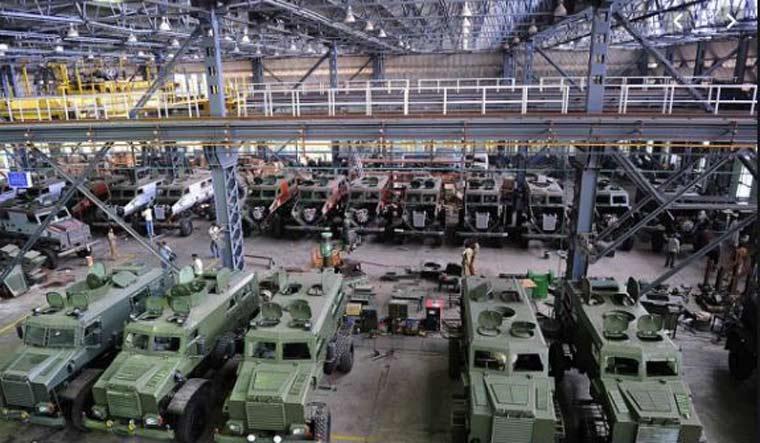‘Ordnance Factories are Actually Atmanirbhar,’ Says Federation Leader; Extends Solidarity to General Strike

Image Courtesy: AFP
Ordnance factories are the real “Atmanirbhar” (self-reliant) organisations in the defence sector and hence must not be corporatised in the interest of the security of the nation and its defence preparedness, All India Defence Employees Federation (AIDEF) general secretary C. Srikumar said.
Referring to the series of measures announced by Finance Minister Nirmala Sitharaman earlier in May to supposedly galvanise indigenous defence manufacturing, Srikumar said that the Ministry of Defence (MoD) – owned Ordnance Factory Board (OFB) is “indirectly being killed” to “encourage” private players in the sector.
As a result, employees from 41 ordnance factories at 24 locations across the country will demonstrate and burn effigies on November 26 – extending full solidarity to the general strike called by the ten Central Trade Unions.
“If FDI (Foreign Direct Investment) is coming in the country, how can you term it as an ‘Atmanirbhar Bharat’… the government’s position itself is contradictory (sic),” he said in an interview to NewsClick last Friday, adding that in such a situation the country’s defence manufacturers will be reduced to only engaging in the “assembling process”, while merely inheriting what he called “screw-driver technology”.
The Narendra Modi-led Centre’s response to the pandemic-triggered economic disruption in the country this year were sectoral reforms – the much touted ‘Atmanirbhar Bharat’ package. For the defence sector, it included raising the cap on FDI in defence production from 49% to 74%, a negative imports list – of 101 items – and, corporatisation of OFB and its subsequent listing on the stock market, among others.
“The government is converting OFB into a corporation only to privatise it (later),” Srikumar said, referring to other public sector undertakings (PSUs) namely, BPCL and BEML alongside others, over whom the spectre of disinvetsment currently looms.
To be sure, the corporatisation of OFB will involve a switch in the model of how ordnance factories operate. Ever since independence, the defence equipment manufacturer has been under the control of Department of Defence Production, MoD. Corporatisation of OFB – first mooted by the TKA Nair Committee in the year 2000 – will convert the factories into a defence public sector undertaking (DPSU).
There are currently nine such undertakings in the defence sector, which enters into a Memorandum of Understanding (MoU) with the ministry for a set period.
In May this year, alongside the sectoral reforms, a new Public Sector Enterprises Policy was also announced, which entailed a maximum of four state-owned companies in strategic sectors, with public firms in other segments to eventually see privatisation.
However, the fear of defence civilian employees of having their service conditions being changed post-privatisation are not entirely unfounded. “Even assuming that the government will treat defence as a strategic sector … what is the guarantee that the ordnance factories will remain as PSUs,” Srikumar said.
“The writing on the board is very clear,” he said, with PM Modi himself pitching for the privatisation of public companies. What will happen then to the products – almost 650, ranging from battle tanks to battle field dresses – currently manufactured by the ordnance factories, asked Srikumar, 97% of which are fully “indigenous,” he said.
Alleging that the employees’ concerns are “not being considered”, the three recognised defence federations – AIDEF, Indian National Defence Workers Federation (INDWF), along with the RSS-affiliated Bharatiya Pratiraksha Mazdoor Sangh (BPMS) – had earlier submitted a strike notice for an indefinite period from October 12 this year. The decision was vouched for by over 80,000 defence civilian employees.
The strike action was, however, later deferred after an intervention by the Chief Labour Commissioner. It was then decided that a meeting with the Secretary, Defence Production (DP) will be arranged in the days to come, in which the federations “can put forward their issues and grievances”.
Srikumar informed NewsClick that one such meeting was indeed held on October 29 in which the three federations were asked to give suggestions for improving the performance of the OFB under the present set up.
Subsequently, a joint proposal was submitted on Friday, November 20. The 24-page document, accessed by NewsClick, carries numerous suggestions, which include restructuring the OFB in a bid to achieve “Rs. 30,000 crore production target during the next 5 years” as an alternative to corporatisation.
Demanding functional autonomy on the lines of the Railway Board, ISRO, and others, the defence federations have pressed the Centre to support the OFB through higher budgetary allocations, which will, at first, bring down the cost of OFB products.
Referring to shortage of industrial employees, the federations proposed to maintain a “rationalised manpower strength” in the ordnance factories. As of October 1, the strength of employees with the OFB is 80,001 as against the sanctioned strength of 1,45,015 as approved by the MoD.
Exploitation and misuse of contract labourers – almost 30,000 – “majority of whom are deployed in permanent and perennial jobs,” in violation of labour provisions, was also highlighted in the proposal document.
Get the latest reports & analysis with people's perspective on Protests, movements & deep analytical videos, discussions of the current affairs in your Telegram app. Subscribe to NewsClick's Telegram channel & get Real-Time updates on stories, as they get published on our website.






















